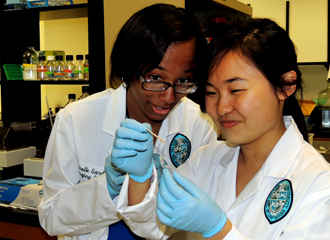Emerging scholars rise from the oil spill
Nine local high school students became environmental health scientists for the summer at Tulane University in an innovative program funded by the Gulf Region Health Outreach Program, part of BP's settlement of class action medical claims in the aftermath of the 2010 Deepwater Horizon oil spill.

High school students Lirelle Gardere, left, and Xiaoshu Zheng “pick” bacterial colonies that have been genetically transformed for additional testing during the Environmental Health Sciences Academy. (Photo by Lynette Dupré Perrault)
Jeffrey Wickliffe, assistant professor of global environmental health sciences in the Tulane University School of Public Health and Tropical Medicine, had the idea to turn the tragedy of the oil spill into something that could give back to the community. He drew on his experience with similar programs in Texas, and worked with Maureen Lichtveld, Freeport McMoRan Chair of Environmental Policy, to flesh out the program.
Lynette Dupré Perrault, an educator with 18 years of experience, became the program director of the Emerging Scholars Environmental Health Sciences Academy. She developed the program to align with state academic science standards while also providing a rich, interactive experience for 11th- and 12th-grade students.
From more than 100 applications, nine students from Orleans, Jefferson and Plaquemines Parishes were selected to spend eight weeks working alongside postdoctoral fellows on projects as varied as screening the yeast genome for regulators of aryl hydrocarbon receptor signaling to examining data on children's health in post-Chernobyl Ukraine.
“They got a very good look into different aspects of what environmental health sciences can do and how it connects to their life,” Perrault says.
The mentor relationship between the students and postdocs was a significant component of the program. “Typically postdocs don't get an opportunity to mentor or teach,” Wickliffe says. Participation in this program will make them more competitive in the academic marketplace, he says.
Both Wickliffe and Perrault consider their first year a tremendous success. “The students truly stepped up and met the mark we set and more,” Perrault says. “Everybody did.”
Dee Boling is director of communications for the School of Public Health and Tropical Medicine.
